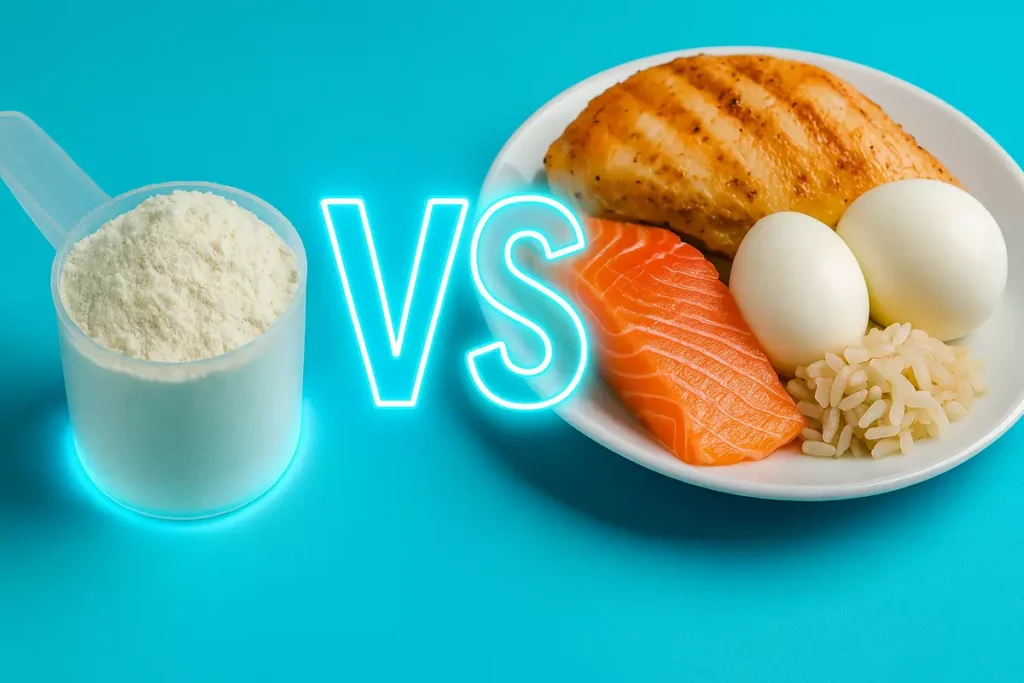Are BCAAs the secret to faster muscle recovery or just another supplement hype?
Many lifters swear by them, claiming they boost energy and protect muscle during tough workouts.
But research and real-life experience tell a more balanced story. Let’s break down whether BCAAs truly work or if you’re better off saving your money.
Table of contents
- Do BCAAs Actually Work?
- What Are BCAAs and How They Function in the Body
- Scientific Evidence – Muscle Growth, Recovery, and Fatigue
- When BCAAs Can Be Helpful (Real-World Scenarios)
- When BCAAs Might Be a Waste of Money
- BCAAs vs. Whole Protein Sources – Which Is Better?
- Practical Tips for Using BCAAs Effectively
- Final Verdict – Should You Buy or Skip BCAAs?
Do BCAAs Actually Work?
Let’s cut straight to the chase—BCAAs (branched-chain amino acids) can work, but only in specific situations.
If you already eat enough high-quality protein from foods and supplements like whey, adding BCAAs probably won’t do much for muscle growth or recovery.
But if you train fasted, cut calories aggressively, or struggle to hit your daily protein target, BCAAs can help you preserve muscle and fight fatigue during workouts.
Learn more in our full guide on BCAAs for muscle preservation during cutting.
What Are BCAAs and How They Function in the Body

BCAAs include leucine, isoleucine, and valine—three essential amino acids your body can’t make on its own.
They play a key role in muscle protein synthesis, helping reduce muscle breakdown and preventing excessive fatigue during tough training sessions.
That’s why many lifters sip BCAAs during intense workouts or when dieting hard.
Scientific Evidence – Muscle Growth, Recovery, and Fatigue
Research shows that BCAAs can reduce muscle soreness and speed up recovery, especially after high-intensity or endurance workouts.
However, studies also reveal that complete protein sources (like whey), which contain all essential amino acids, are usually more effective for building muscle than standalone BCAAs.
When BCAAs Can Be Helpful (Real-World Scenarios)

From my own experience, BCAAs shine in a few specific cases:
- Fasted Cardio: During morning cardio sessions on an empty stomach, sipping BCAAs helped me feel less drained and protected muscle mass.
- Aggressive Cutting: When I was deep into a fat-loss phase and eating fewer calories, BCAAs gave me an extra layer of muscle preservation.
- Low-Protein Diets: For people who struggle to eat enough protein, adding BCAAs can support recovery between meals.
For example, Mark, a client from the UK, used BCAAs during his prep for a bodybuilding competition. Even on a low-calorie diet, he maintained muscle size while dropping fat.
If you’re in a cutting phase, check out our in-depth guide on how BCAAs help preserve muscle.
When BCAAs Might Be a Waste of Money
On the flip side, if your protein intake is already high (from chicken, eggs, whey protein, etc.), BCAAs are usually unnecessary.
I learned this the hard way—early in my journey, I spent money on BCAAs while already hitting 150–180g of protein daily.
I didn’t notice any difference in strength or recovery. Similarly, Lucas, a client from Brazil, tried BCAAs during a bulk.
We later dropped them completely and saw zero change in muscle gains or performance. For bulking, this list of the best BCAAs might help you decide if they’re even worth it.
BCAAs vs. Whole Protein Sources – Which Is Better?

Whole proteins contain all nine essential amino acids, not just three.
This makes them far superior for muscle growth and overall recovery.
Think of BCAAs as a quick patch, not the main building material.
If you want real progress, whey protein shakes, chicken breasts, eggs, and fish will always outperform BCAAs.
For strength and size gains, see how BCAAs stack up against creatine.
Practical Tips for Using BCAAs Effectively
If you still want to use BCAAs, here’s how to do it wisely:
- Take them intra-workout or before fasted training.
- Use them during low-calorie dieting phases.
- Aim for 5–10g per session, not excessive amounts.
- Don’t replace proper meals or full protein shakes with BCAAs.
One of my clients, Emma from Canada, often had long gaps between meals because of her job.
Sipping BCAAs before evening workouts kept her energy steady and reduced post-training soreness.
For dosing strategies, check our guide on taking BCAAs multiple times a day.
You can also explore whether powder or capsules fit your routine better, and choose between flavored or unflavored BCAAs based on taste preferences.
Final Verdict – Should You Buy or Skip BCAAs?
Here’s my honest, professional advice:
- Buy: If you train fasted, cut calories hard, or can’t reach your daily protein needs.
- Skip: If you’re already eating plenty of high-quality protein.
BCAAs aren’t magic—they won’t make you bigger or stronger overnight.
But in the right scenario, they can help you train harder, recover faster, and hold on to muscle while dieting.
Ultimately, focus first on real food and complete protein sources.
Once you’ve nailed that, you can decide if BCAAs are worth adding to your supplement stack.



Leave a Reply